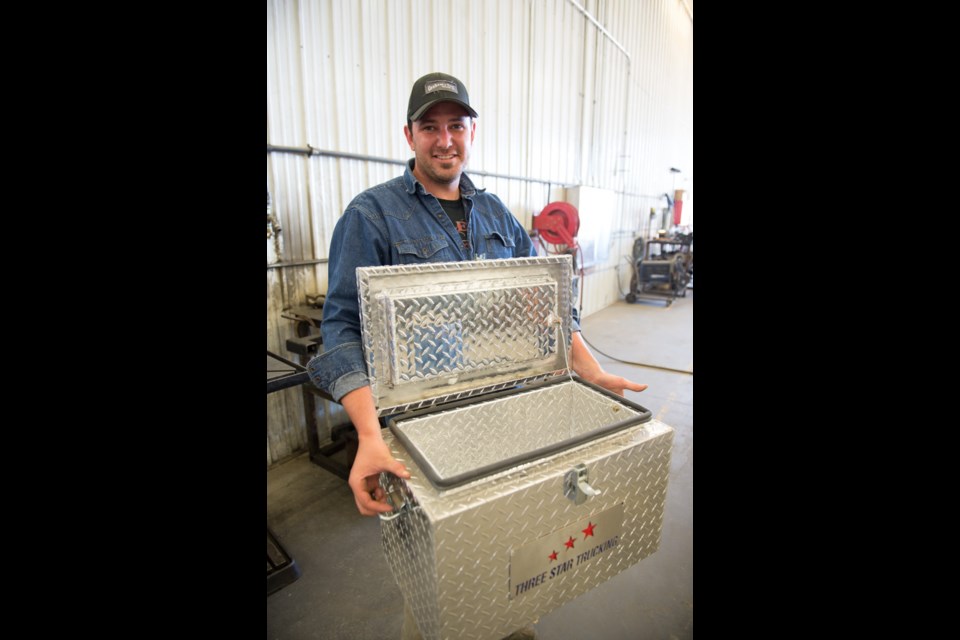Alida– When you have a large fleet of trucks and are in a relatively remote area, it helps to have an in-house repair capability. But Three Star Trucking of Alida has gone beyond having in-house mechanics. They now offer full welding and body work shops that cater to third-party clientele in addition to their own units.
The range of services available include heavy truck and trailer collision repair, sandblasting, welding and fabricating.
Alan “Skip” Skipper is the body shop manager, which includes industrial sandblasting and coating.
“We started getting heavy into it when I came on about 18 months ago,” he said.
A few years ago several of the larger trucking fleet operations, including Three Star, started up their own trailer repair operations. It turns out that there’s something in the Bakken oil and produced water that likes to chew through aluminum trailers.
Justin Boettcher handles field sales and supervises NGL operations with Three Star. He said, “Salt water, produced from conventional oil and Bakken oil is very corrosive and raises hell with aluminum tanks.”
They were repairing their trailers along the way, sub-contracting the work, before deciding to bring it in-house.
Boettcher said, “We started repairing trailers and decided to get SGI-accredited and move into heavy trucks.
Their mechanic shop works primarily on in-house units, but will do things like brakes and tires for third parties. They can also do safety inspections and repairs for leased operators.
The body shop came into being two years ago, and received its all-important SGI accreditation in the spring of 2014. Skipper noted they are the only shop in the area that handles major collisions for big trucks. He said they just completed a $130,000 repair on a 2013 Mack tri-drive tractor that had rolled over. They completely swapped the cab and bunk, replaced the stack, fuel tanks and hood.
“We do a lot of glass on our own company trucks,” he said.
Typical basic repairs the body shop does include damaged hoods and fuel tanks, often caused by bumps.
They don’t get a lot of major repairs, yet, but they’re working on it.
“Our busiest thing is the industrial blasting and painting. We’re pretty steady on that,” he said. “We’ll do anything.”
Examples include a pumphouse for a new drilling rig and a liquefied propane trailer.
Skipper is a red-seal collision technician. He has three other workers in the body shop. It makes a difference when you’re working on heavy trucks. “You don’t need two guys to put a steering box on a pickup, but you do on a Mack,” he said.
The body shop has two journeymen bodymen and two sandblasters.
The industrial blasting and painting “took off,” according to Skipper.
“It’s one of our mainstays. We’d like to see more heavy trucks come in. We’re a bit out of the way, but it’s coming. People don’t want to spend money right now,” he said, commenting on the low price of oil and its impact on the industry.
The company has a bed truck that can be used to move rig components for blasting and paint. They haven’t had any service rigs come in yet, but they’re working on it.
“We’re ready to rock and roll any time,” Boettcher added.
Welding
Rounding out the mechanic and body shop is the welding shop, its own division. It’s a Transport Canada-registered tank repair shop, with B pressure certified welders.
The welding shop is equipped with a 12-foot brake and 10-foot sheer, each capable of handling quarter-inch thick material. There’s also a roller and lathe.
Five people work in the welding shop. Four are red-seal journeymen welders, and three hold B pressure certifications.
Justin McNish is the welding shop manager. He said, “We fix our own tanks and customer tanks, SGI claims.”
The welding and fab shop, like the paint shop, is SGI-accredited.
“We do rollovers, collisions, rotten tanks,” he said, “and tornado repair.”
The welding shop builds boxes and chain racks for trucks and trailers.
A lot of the work is repairing rotten tanks, including cutting out and replacing sumps and valves. Coatings used to line the inside of tanks eventually fail, resulting in corrosion and the need for corrective repair.
Boettcher said of the coatings, “Of over 100 trailers we’ve had, they’ve all failed.”
A new trailer might see two-to-three years before requiring repair, depending on its use. Doing transfers involving seven loads a day takes its toll.
The first step is to blast the tank to see how weak it is. Then they remove and repair the corroded parts. If it’s pitted, it needs to be cut out. Bolt-on valves are typically replaced.
Once put back together, the paint shop tackles coating the interiors of tanks.
While aluminum is widespread in trailer construction, there are steel trailers, too. And they will also rot out when the coating inside fails, according to McNish. “Salt water eats it up.”
Three Star is trying different coatings to see if there’s a better one out there.
With the price of oil down, it makes more sense to repair a trailer than replace it, according to Boettcher. A new trailer might cost $130,000, whereas the cost of repairing on is less than half of that.
“Between the mechanic, paint and weld shops, I don’t think there’s anything we can’t do,” Boettcher concluded. “A lot of times a trailer starts in the mechanic shop, does the whole loop (of shops) and comes back.”



